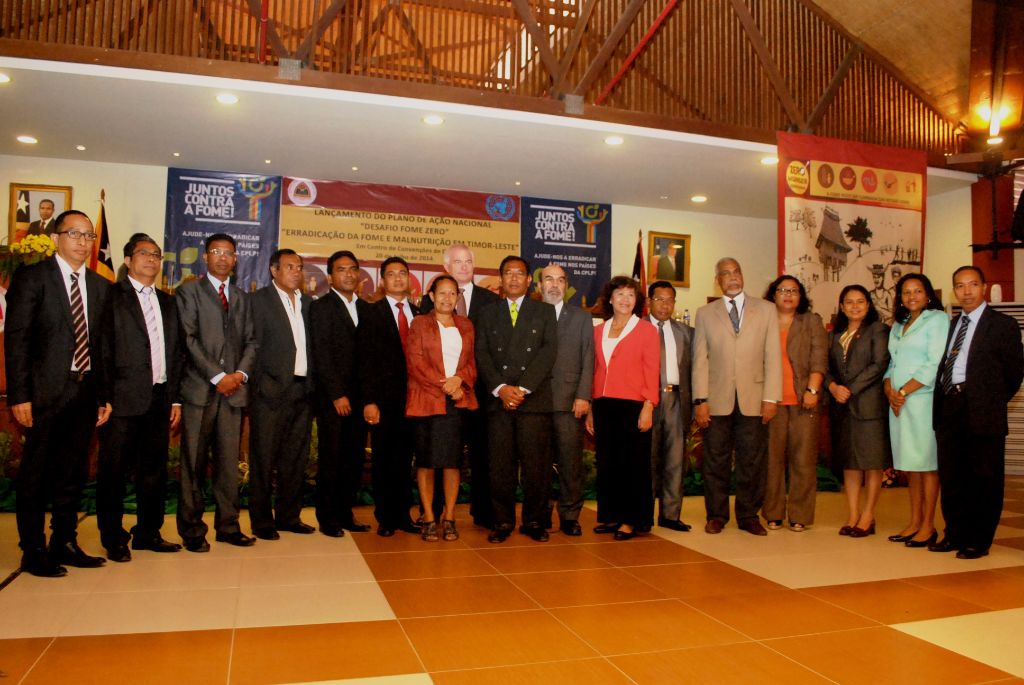Zero Hunger Challenge: Make Hunger History
Event: Launch of the National Action Plan on Hunger and Malnutrition Free Timor-Leste and “Juntos Contra a Fome”
20 July 2014, Dili
Your Excellency, Mr. Fernando La Sama de Araújo, The Vice Prime Minster of the Democratic Republic of Timor-Leste
Your Excellency, Mr. Engr. Mariano Sabino, Minister of Agriculture and Fisheries of Timor-Leste
Your Excellency, Dr. Sergio Lobo, Minister of Health of Timor-Leste
Dr. Jose Graziano da Silva, Director General of FAO
Honourable Members of Parliament and Development Colleagues,
Excellencies,
Ladies and Gentlemen,

Today is a special day. Let me start by congratulating all who have made this day possible. We are here today to launch the implementation plan that goes to the district and household levels to make hunger history: to ensure 100 per cent equitable access to adequate, nutritious and affordable food all year round; to ensure 100 per cent increase in smallholder productivity and income; to ensure all food systems are sustainable and there is zero loss or waste of food; and most important of all to end stunted growth of our children, especially in remote communities. It is easy to launch campaigns but harder to have such a serious comprehensive action plan that carries the promise of food security and nutrition for all; that puts people at the centre of development.
My special thanks goes to the Prime Minister, H.E. Mr. Kay Rala Xanana Gusmao. It was my privilege as Executive Secretary of ESCAP to have the Prime Minister chair the 69th Commission session and lead the regional launch of the United Nations Secretary-General’s campaign on Zero Hunger. Together with other Heads of State, the UN Deputy Secretary-General and several United Nations Under-Secretary-Generals, he led the region to eliminate hunger and accelerate the achievement of the Millennium Development Goals.
The Prime Minister became the first leader to pilot the “Zero Hunger Challenge” at the country level, to complement the programmes on hunger and malnutrition that his government and the country already have in place. Together with Princess Maha Chakri Sirindhorn of Thailand we launched the national level campaign in Dili at the National Parliament in January of this year. I congratulate and thank all members of Parliament and I thank all the political parties which spoke in support of the campaign. It was clearly seen by all as a national agenda rather than the government’s agenda.
The challenge now is in the implementation. But I am encouraged as there is the establishment of a national implementation council (KONSSANTL) consisting of eight relevant government ministries, the UNRC and members of the UNCT, co-chaired by the Minister of Agriculture and the Minister of Health. This council will be supported at every local district by the District Food and Nutrition Security Committee that would also include NGOs, the private sector and the church. There will be a permanent technical secretariat with representatives from development partners, donor agencies and WFP, FAO, UNICEF and WHO to help with the implementation. This is a huge national effort that has been put in place to achieve the goals of Zero Hunger. The whole national effort will report regularly to both the Prime Minister and me, as the Special Adviser of the United Nations Secretary-General. I am especially pleased to see the allocation of at least 10 per cent of the annual State Budget allocated to implement the plan to have Timor-Leste free of hunger and malnutrition by 2025.
My special thanks to my colleague, the Director General of FAO, Mr. Jose da Silva, for his support of this campaign. My thanks also to the FAO team in Bangkok and in Dili for providing technical support. According to the FAO, this work in Timor-Leste has set a new global standard for how campaign goals can be realised and how Zero Hunger should be implemented in all regions of the world. It also shows what development partners can achieve working together as a system to support the leadership and the people of Timor-Leste. More important, it shows the difference that can happen when there is leadership and political will at the country level.
Hunger is an unforgivable development failure. We need to urgently invest in women farmers, small farmers and entrepreneurs providing income security, buffers and agricultural insurance against price volatility and disaster-related shocks. Let us put people back at the heart of our food systems. Let us make sure that poverty is no longer associated with our farmers. Let us work together to beat the scourge of hunger, the most basic prerequisite for development success because inclusive growth, social equity and sustainable development will not happen on empty stomachs. Let us together make hunger history.